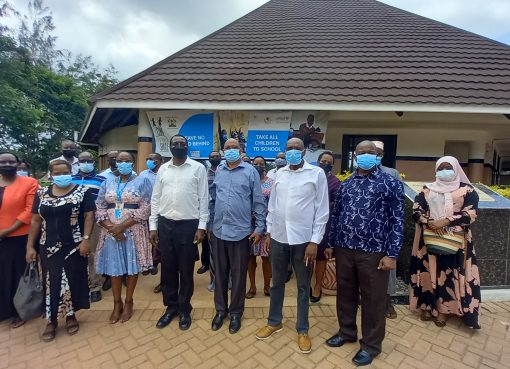Nakuru County Government is revamping all its Youth Polytechnics and Technical Vocational Education Training Institutes (TVETs) in a move aimed at empowering learners with industry-responsive skills that will help bridge the skills gap.
The County Executive Committee Member (CECM) for Public Service Management Ms Jacqueline Osoro said the County was enhancing the institutions leadership and management of human and financial resources through continuous audit and robust capacity building of the managers and instructors.
Ms Osoro added that the institutions were further being supported to initiate income generating activities so that they become self-reliant and models of inculcating practical lessons in project management.
The CECM noted that globalization, technological transformation and increased competition due to liberalization have heightened the importance of youth polytechnics and TVETs, hence the need for revamping the institutions.
Ms Osoro spoke when she received students and tutors from Kitale National Polytechnic who later toured a Digital Hub, Textile Hub, a Music Podcast and a Recording Studio, all domiciled at Menengai Social Hall within Nakuru Town East Sub-County.
She stated that the County Government was partnering with International Labour Organization (ILO) and several private companies to ensure the students get hands-on skills by spending at least 50 percent of their training time working in relevant industries.
Nakuru County has 24 youth polytechnics spread across the 11 sub counties. According to the Technical Vocational Education and Training Authority (TVETA), there are two accredited public TVET institutions in the county including the Dairy Training Institute in Naivasha and the Rift Valley National Polytechnic in Njoro and a total of 18 accredited private TVET institutions.
The CECM disclosed that Governor Susan Kihika’s administration has set aside funds towards youth empowerment initiatives including upgrading facilities at the County’s Vocational Training Centres (VTCs) with the aim of meeting required standards and attracting more youth enrolments.
The county, she added, was exploring a model where students would be subjected to a combination of theory and practical training, in a real-life work environment through an interchange of training at a TVET institute and in a company or industry.
“We are updating the training equipment in the TVETs and youth polytechnics to reflect advancement in technology,” said the CECM.
Ms Osoro gave the County’s commitment to enrolling more young people in various courses that are not offered professionally at the University level, a move she said would empower them for the job-market.
The County official observed that close links between enterprises and training centres have been at the core of Western World’s economic success since the 19th century, adding that by building up a TVET ecosystem in Kenya, it would provide concrete job opportunities for many unemployed youths.
She expressed appreciation for the contribution made by the private sector in the formal employment, but noted with regret that in some cases, the sector was struggling to find candidates due to a mismatch between the courses offered at TVET institutions.
She however advised the sector to partner with tertiary institutions to develop specialized short-term practical courses, for example, on entrepreneurship, to further sharpen graduates’ business skills.
The CECM affirmed that the County was keen to forge partnerships with the private sector in areas of research with emphasis on the changing market environment and consumer trends that will help build a valuable knowledge base that the private sector and the county government could leverage to improve technical training centres.
She further said the National Government had rolled out new technical and vocational courses as it began to implement the Competence-Based Education and Training (CBET) policy framework aimed at delivering industry responsive skills.
The CECM emphasized the need for an effective Technical and Vocational Education Training (TVET) system, which includes development of occupational standards, training programmes, facilitation of training as well as assessment, which she said will play a key role in achievement of the Big Four Government agenda and Vision 2030.
Governor Susan Kihika has been assuring that her government was prepared to pay Sh30, 000 as part of one-year school fees for all students enrolled in public polytechnics within the devolved unit.
The decision to pay part of the school fees, the governor explained, was inspired by the willingness, support, and goodwill of parents, adding that the action would boost enrolment.
By Esther Mwangi and Felistas Kahungu





